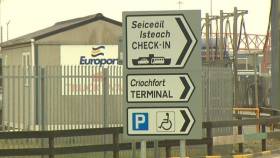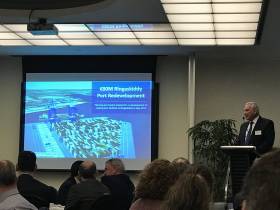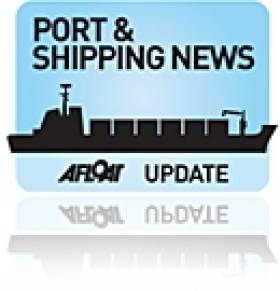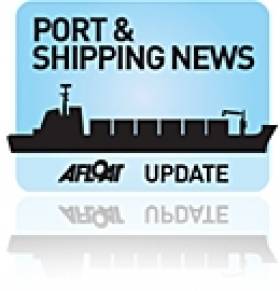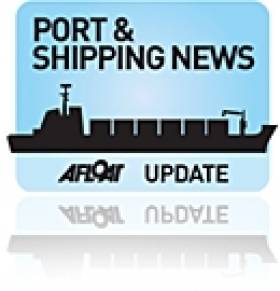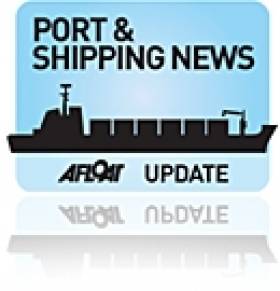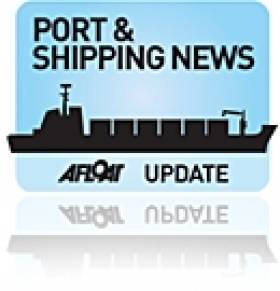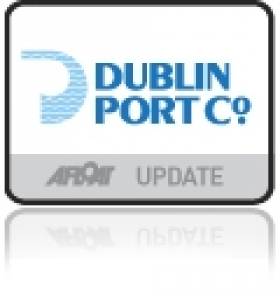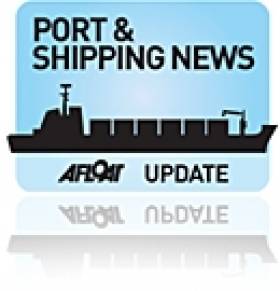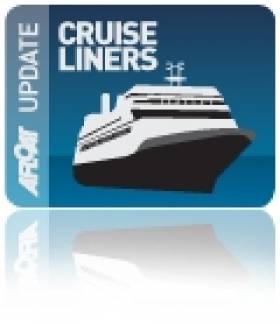Displaying items by tag: Irish ports
#Ports&Shipping - The European Commission has drawn up proposals for developing maritime links between Ireland and continental Europe as part of contingency plans for a possible 'no deal' Brexit outcome.
As RTE News reports, Sinn Féin MEP Liadh Ní Riada has seen an internal document which details a series of "planned European Commission proposals" for "Brexit preparedness".
They deal with changes in a wide range of areas such as banking, imposing tariffs, energy efficiency, medicine, visa and transport.
Among the proposals is a plan to design a new maritime route to link Ireland and the continental part of the North Sea-Mediterranean corridor.
Speaking to RTÉ at the European Parliament in Strasbourg, Ms Ní Riada said: "It’s very reassuring and positive for us to see this document. It is coming from the Secretary General of the Commission, Martin Selmayr, and it outlines the need to create a maritime channel, or a bridge, metaphorically speaking, from Ireland to the rest of Europe."
She believes the plan could see investment in existing Irish ports through the Connecting Europe Facility, an EU fund for developing transport infrastructure.
To read more on the proposed direct maritime shipping links, click here.
#Ports&Shipping - At significant risk of isolation will be Ireland following Brexit and this will need EU funding to shore up the lack of connectivity to major European routes says the Port of Cork chief executive.
As the Irish Examiner writes, Brendan Keating says there was a case to be made for grant aid from EU institutions following the UK leaving the bloc.
“We will be significantly more isolated because of Brexit. I’m concerned about maritime transport connectivity. State aid rules as currently constituted don’t allow EU support of the purchase of ships or that kind of mobile asset, I believe.
“However, I do believe some kind of subvention can be issued to operators of such ships for such services.
“We have similar arrangements in terms of the servicing of regional airports of this country, to the public service obligations-type instruments.
For further comments and developments for the Port of Cork click here.
3% Increase For Irish Port and Shipping Volumes In 2013
#Ports&Shipping - The volume of cargo shipped through Irish ports saw an overall increase of 3% in 2013, with three of the five principle freight segments experiencing growth.
This is according to the 11th annual edition of the Irish Maritime Transport Economist publication.
Irish Maritime Development Office director Liam Lacey commented that the increase gives "cause for greater optimism than has been the case in recent years.
"The volume of trade that moves through Irish ports is a reliable indicator of national economic performance and activity," he added.
“Although traffic through Irish ports has not returned to the levels that were recorded prior to the recession, it is noteworthy that the iShip Index, which is an aggregate measure of trade volumes, rose to 862 points for 2013, up 3% on the previous year."
Within this increase, figures show that Ro/Ro volumes rose by 6% buoyed by transfers from the Lo/Lo mode, while dry-bulk traffic also grew by 6%, resulting mostly from an increased demand for animal feed and coal.
“Additional demand for construction-related materials contributed to break-bulk traffic growing to 961,803 tonnes, up 20% on the previous year," said Lacey, who added that while liquid-bulk and Lo/Lo traffic fell by 14% and 1% respectively, these decreases in volume were caused by market anomalies rather than a reduction in total demand.
Meanwhile, within the tourism sector, Irish ports "continued to capitalise on the global rise in cruise business over the last decade, as vessel calls to the island of Ireland rose to 277 during 2013.
"In this category, the majority of visitors came from North America, Britain and Germany," said Lacey.
Ferry tourism, encompassing services between the Republic of Ireland and Great Britain, also showed an increase of 1% to 2.33 million passengers. "This increase marks an important turning point as growth returns to a market segment that has been in decline since 2010," said the IMDO director.
As for the first four-plus month of 2014, Lacey said preliminary figures "suggest that the trends in the maritime transport sector that were observed in 2013 have continued and that a degree of cautious optimism is justified.”
Commenting on the report, Minister for Transport Leo Varadkar said he welcomed initiatives being undertaken by Ireland's ports "to provide the additional capacity that will be needed as our economy continues to recover and expand.
"I also welcome recent increases in shipping capacity and the development of new trade routes. These developments auger well for economic growth and are supportive of the objectives of the National Ports Policy and the Government’s plan for National Recovery 2011-2016.
"As reported in the IMTE, the international shipping environment remains challenging. Nonetheless, we have begun to see signs of recovery in the Irish maritime sector, as evidenced by the growth in trade, through Irish ports in 2013.”
New Bill Exempts Port Companies From FOI
#Ports - Ireland's port companies will be exempt from the Freedom of Information Act under amendments contained in a new bill put forward by Minister for Public Expenditure and Reform.
Last week the minister announced the publication of the FOI Bill, which intends to extend FOI to all public bodies in line with the commitment included in the Programme for Government.
However, a list of 38 commercial State companies are to be exempted from the mandate to fulfil FOI requests, as detailed on page 78 (Schedule 1 Part 2) of the bill - available as a PDF to read or download HERE.
This list includes the Bantry Bay Harbour Commissioners, the Drogheda Port Company, the Dublin Port Company, the Dun Laoghaire Harbour Company, the Galway Harbour Company, the New Ross Port Company, the Port of Cork Company, the Port of Waterford Company, the Shannon Foynes Port Company and the Wicklow Port Company.
Other marine-related agencies listed are the the Commissioners for Irish Lights, the Loughs Agency, the National Oil Reserves Agency and Waterways Ireland.
According to The Irish Times, the reason for these exemptions is "so as not to diminish the ability of such bodies to perform their core functions, or in the interests of the security or financial interests of the State".
Weak International Demand sees Fall of 10% on Irish Exports
#IrishExPORTS – A weak international demand has seen a fall of 10% on the value of Irish exports during the month of February.
New figures from the Central Statistics Office (CSO) indicate exports decreased by €753 million to €6.65 billion in February compared with the same period last year.
The decline was driven by a 15 per cent (€309 million) fall in exports of medical and pharmaceutical products and an 18 per cent (€286 million) drop in organic chemical exports.
To read more on this story The Irish Times has a report.
IMDO Shipping Review: Irish Industrial Productivity Drops, European Port Growth, Asia-Europe Trade Increases and much more…
#Ports&Shipping -The latest IMDO Weekly Shipping Market Review reports that Irish industrial production fell by almost 2 per cent in January, compared to the previous month, in line with weakening trend in industry since mid-2012, according to data released by the Central Statistics Office (CSO).
European Ports: Throughput at northern European ports will grow by 1.8% in 2013, after a decline of 0.8% last year, according to the latest North Europe Global Port Tracker report.
Container Market: Asia-Europe trade volumes lane experienced their first year-on-year increase in almost a year, according to Container Trade Statistics. The latest data reveals that westbound volumes on the Asia to Europe trade increased by 2.5% year on year in January to reach 1.3m TEU.
The complete IMDO Shipping Markets Review for week 10 is available as a PDF to read or download HERE.
IMDO Shipping Review: Weak Global Container Demand, Reduced Rotterdam Shipping and Increased German Shipping Funds
#SHIPPING -The latest Weekly Shipping Market Review from the Irish Marine Development Office (IMDO) reports of the weak global demand in container volumes in the world's top 25 ports.
The number of ships calling to Rotterdam have decreased further in 2012 where there were fewer ferry service departures, reducing the number of arrivals by 2,347 to 32,057 ship visits.
German shipping funds sold three times as many ships in 2012 as in the previous year, according to figures released by Deutsche Fonds Research (DFR). 86 vessels were disposed of last year, in comparison to only 25 in 2011.
The complete Shipping Markets Review for week 8 is available as a PDF to read or download HERE.
Slight Profit Rise for Dublin Port
#DUBLIN PORT - Turnover at the Dublin Port Company has edged fractionally higher last year at €69.1m, with profits also increasing slightly.
Exports were up at the commercial semi-state port to 11.5 million tonnes but were offset by a 2pc decrease in imports to 16.6 million tonnes. Operating profit increased by €0.8m to €27.8m on 2010.
The State also took three times more cash in dividends than in 2010. In accounts filed with the companies office, the company said it paid out €16.5m, this compares with €5.5m the previous year.
For more the Irish Independent has a report HERE.
Competition Authority to Examine Irish Ports
#PORTS & SHIPPING – Irish Ports are to be reviewed by an in-depth Government Plan to see how funding expansion of the nation's ports can be carried out through the private sector. The Government have ruled-out selling strategic port facilities to fund such projects.
Transport Minister Leo Varadkar said that a study by the Competition Authority into Ireland's ports would also examine whether Dublin Port had an economically dominant position. Minister Varadkar said that "Dublin Port is hugely successful with 40% of our GDP going through it."
He said that "part of our study will look at whether it is profitable because it is dominant or because it is very competitive."
Minister Varadkar said that "Dublin Port is hugely successful with 40% of our GDP going through it" and added "part of our study will look at whether it is profitable because it is dominant or because it is very competitive."
For more on this story as reported by RTE News click HERE.
#CRUISE LINER SAFETY – Following the Costa Concordia incident off the Italian coast in January, there are to be "tighter" inspections of cruiseships docking in Irish ports according to the State's Marine Survey Office.
Checks on safety and crew handling of "abandon ship" drills and fire-fighting will be stepped up under the office of the Department of Transport. Marine surveyors will also conduct "detailed, additional" checks on whether or not crews are trained and familiar with their vessels, the office says.
Some 30 passengers were confirmed dead and two are still "missing" after the Costa Concordia ran aground and partially sank off Isola del Giglio, Tuscany, on the night of January 13th last.


























